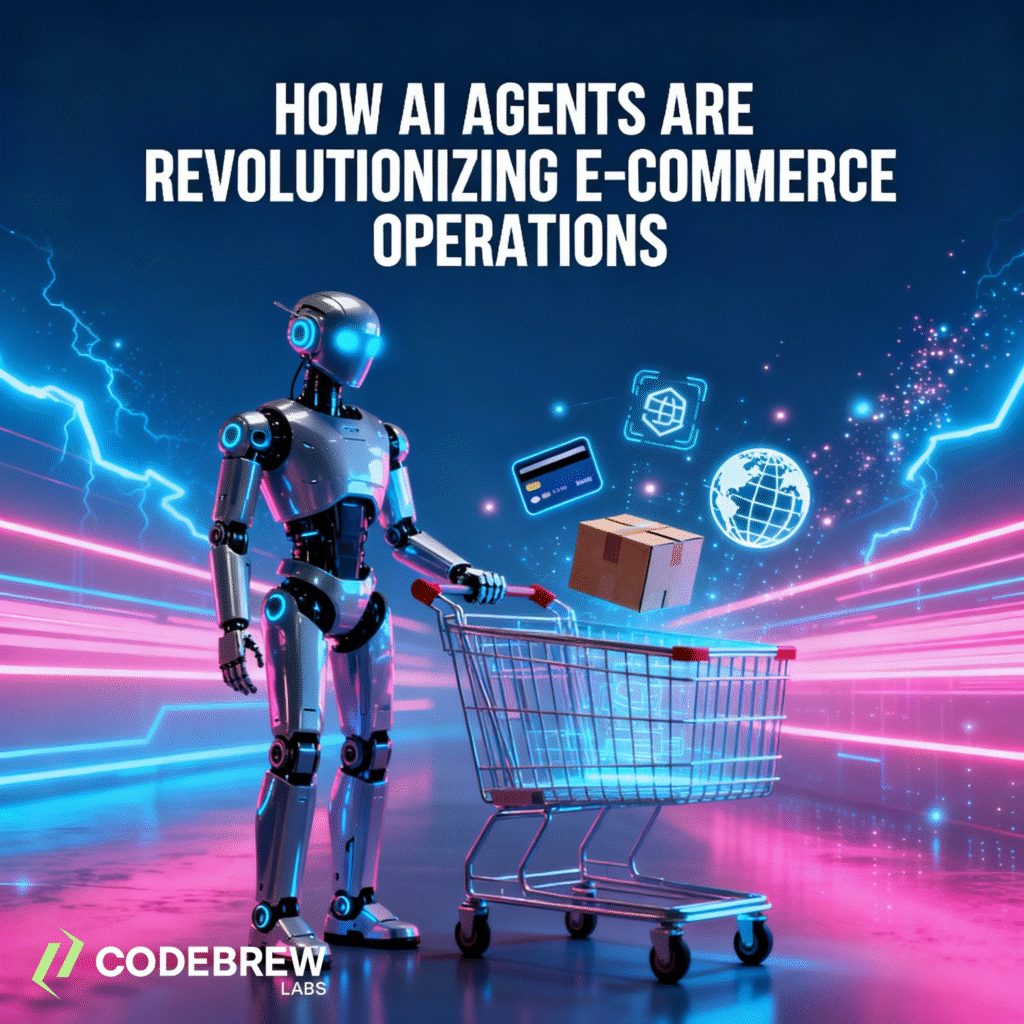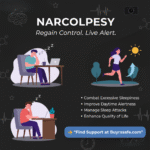Introduction
E-commerce has transformed the way people shop, making products and services accessible anytime and anywhere. In 2025, the industry is more competitive than ever, with businesses vying to offer faster, smarter, and more personalized shopping experiences. However, managing large-scale operations, ensuring smooth customer interactions, and maintaining efficient supply chains has become increasingly complex.
Traditional automation tools, like basic chatbots or rule-based systems, often fall short when handling the dynamic needs of modern e-commerce. They struggle with personalization, proactive decision-making, and understanding context, leaving businesses with limited efficiency and customers with underwhelming experiences.
This is where AI agents come into play. These intelligent systems are designed to learn from data, predict outcomes, and autonomously perform tasks that would normally require human intervention. From enhancing customer experiences and personalizing shopping journeys to optimizing supply chains and marketing campaigns, AI agents are revolutionizing the e-commerce landscape.
Partnering with an AI agent development company allows businesses to leverage cutting-edge AI technologies tailored to their specific needs. Whether it’s for automating repetitive tasks, predicting inventory demands, or creating hyper-personalized marketing campaigns, AI agents are proving to be indispensable tools for achieving sustainable growth and maintaining a competitive edge in the digital marketplace.
With the rise of AI-driven automation, businesses that adopt AI agents are not just improving efficiency they are redefining the very nature of online shopping, offering smarter, faster, and more satisfying experiences to customers.
What Are AI Agents in E-Commerce?
AI agents are intelligent software programs capable of performing complex tasks, learning from data, and making decisions autonomously. In e-commerce, they can manage multiple functions simultaneously, from customer support to inventory optimization, often exceeding the efficiency of traditional human-managed processes.
Difference Between Traditional Automation Tools and AI Agents
- Traditional Automation Tools: Execute predefined rules, limited flexibility, reactive.
- AI Agents: Adapt to new data, predict outcomes, provide personalized responses, and act proactively.
Key Use Cases in Online Retail
- Virtual shopping assistants are helping customers find products
- AI-driven inventory management for predictive restocking
- Personalized marketing recommendations based on user behavior
- Automated order tracking and logistics optimization
These capabilities allow AI agents to address both operational challenges and customer expectations in real-time, creating a more seamless online shopping experience.
Key Features of AI Agents for E-Commerce
AI agents offer a range of features that enhance both backend operations and the customer experience:
- Personalized Product Recommendations: Boost sales by suggesting relevant products based on browsing history and preferences.
- Predictive Inventory Management: Forecast product demand to avoid overstocking or stockouts.
- Dynamic Pricing and Promotions: Adjust prices in real-time according to market trends and customer behavior.
- Customer Behavior Analysis: Gain insights into buying patterns and preferences to optimize business strategies.
Integrating these features makes e-commerce businesses more agile, data-driven, and responsive to market dynamics.
How AI Agents Improve Customer Experience
Modern consumers expect instant support, personalized recommendations, and seamless interactions. AI agents deliver exactly that:
- Real-Time Assistance Through Chat and Voice Agents: Resolve queries instantly and provide guidance without human intervention.
- Multi-Channel Support: Operate seamlessly across websites, mobile apps, and social media platforms.
- Personalized Shopping Journeys: Offer recommendations, promotions, and content tailored to each user.
- Faster Problem Resolution and Support: Reduce response times and improve overall satisfaction.
By enhancing customer experiences, AI agents not only drive engagement but also foster loyalty and repeat purchases.
AI Agents in Supply Chain and Inventory Management
Beyond customer interaction, AI agents optimize backend operations:
- Predicting Demand and Restocking Products: Analyze sales trends and seasonal patterns to forecast inventory requirements.
- Optimizing Warehouse Operations: Automate stock placement, picking, and dispatching to reduce errors.
- Reducing Delivery Delays and Logistics Costs: Plan delivery routes, monitor shipments, and predict potential bottlenecks.
These improvements help businesses maintain operational efficiency while lowering costs and improving delivery accuracy.
AI Agents in Marketing and Sales Optimization
AI agents are a game-changer for marketing and sales:
- Personalized Email Campaigns: Target specific customer segments with tailored content.
- Predictive Analytics for Sales Forecasting: Make informed decisions about promotions and stock.
- Customer Segmentation and Targeting: Identify high-value customers and design retention strategies.
- Improving Conversion Rates: Optimize product recommendations, landing pages, and checkout processes.
By integrating AI into marketing, e-commerce companies can increase ROI and deliver personalized shopping experiences at scale.
How AI Agents Help Reduce Operational Costs
AI agents streamline processes and reduce overhead:
- Automating Repetitive Tasks: Handle routine queries, order processing, and reporting.
- Minimizing Human Error: Ensure accuracy in inventory management, pricing, and fulfillment.
- Efficient Resource Allocation: Free human employees to focus on strategic tasks that drive business growth.
Investing in AI agents ultimately translates into higher efficiency, reduced operational costs, and increased profitability.
How We Help in Creating AI Agents for E-Commerce
Partnering with an AI agent development company ensures your AI solution is tailored for maximum impact:
- Expertise in Custom AI Agent Solutions: Designed specifically for your e-commerce business.
- End-to-End Development Process: From initial concept to full deployment and maintenance.
- Integration with Existing Platforms and CRMs: Works seamlessly with Shopify, WooCommerce, Magento, and other systems.
- Post-Deployment Monitoring and Optimization: Continuous learning to improve efficiency and user satisfaction.
Our approach guarantees AI agents that are intelligent, adaptive, and aligned with your business goals.
Steps to Build a Powerful E-Commerce AI Agent
- Requirement Gathering and Business Analysis: Identify objectives, challenges, and expected outcomes.
- Designing AI Architecture and Selecting Algorithms: Choose the right models for prediction, recommendation, and natural language processing.
- Data Collection, Training, and Testing: Ensure high-quality data for accurate decision-making.
- Deployment and Continuous Learning: Launch the AI agent and refine it over time based on performance data.
Following this structured approach ensures the creation of scalable and effective AI agents that deliver tangible results.
How Much Does It Cost to Develop an E-Commerce AI Agent?
The cost depends on the complexity of features and integration requirements:
- Factors Affecting Pricing: Number of platforms, AI model complexity, third-party integrations, and customization.
- Estimated Starting Price: Basic AI agent solutions start from $5000.
- Advanced, Enterprise-Level Solutions: Comprehensive, fully customized AI agents can cost between $20,000–$50,000+.
Investing in AI agents is a strategic move, ensuring long-term efficiency, cost savings, and competitive advantage.
Why Choose Us for AI Agent Development?
Selecting the right AI agent development company is essential for success:
- Proven Track Record: Successfully delivered projects across multiple e-commerce sectors.
- Experienced Team: Skilled AI engineers and data scientists for high-quality solutions.
- Transparent Development Process: Clear communication and milestones throughout the project.
- Scalable and Future-Ready Solutions: AI agents that grow with your business.
- Dedicated Post-Deployment Support: Continuous optimization and troubleshooting.
Our focus is on delivering AI agents that provide measurable business impact and long-term value.
Future Trends of AI Agents in E-Commerce
The e-commerce AI landscape continues to evolve:
- Hyper-Personalization and Predictive Shopping: AI anticipates needs and delivers tailored experiences.
- AI-Driven Customer Insights: Leverage data for smarter business decisions.
- Integration with AR/VR and Voice Shopping: Create immersive and interactive shopping experiences.
- Ethical AI and Data Privacy Compliance: Ensure secure, transparent, and responsible AI usage.
These trends indicate that AI agents will remain central to the future of e-commerce operations.
Challenges in Implementing AI Agents for E-Commerce
Despite the benefits, there are challenges:
- Data Quality and Management: High-quality data is essential for accurate predictions.
- Integration with Multiple Platforms: Ensuring smooth operations across systems can be complex.
- Accuracy of Predictions and Recommendations: Continuous testing and optimization are required.
- Privacy and Security Standards: Compliance with GDPR, CCPA, and other regulations is critical.
Addressing these challenges proactively ensures a successful AI agent implementation.
Conclusion
AI agents are revolutionizing e-commerce by transforming how businesses interact with customers, manage operations, and make data-driven decisions. They are no longer optional; they are becoming essential tools for competitiveness in 2025.
From personalized shopping experiences to intelligent supply chain management, AI agents empower businesses to operate more efficiently, reduce costs, and enhance customer satisfaction. By partnering with a reliable AI agent development company, businesses can build tailored AI solutions that evolve with market trends and customer expectations.
Embracing AI agents is not just about automation; it’s about creating smarter operations, deeper customer engagement, and sustainable growth. Businesses that invest in AI agents today are positioning themselves to lead in the increasingly competitive e-commerce landscape of tomorrow.
With AI agents, the future of e-commerce is not only smarter, it’s faster, more responsive, and fully customer-centric.
FAQs
1. How do AI agents improve e-commerce customer experience?
AI agents offer instant help, give smart product suggestions, and support customers across different channels to boost satisfaction.
2. What affects the cost of developing an e-commerce AI agent?
The cost depends on features, design, integrations, and customization. More advanced AI tools or large-scale systems cost more.
3. Can AI agents work with existing e-commerce platforms?
Yes, they can easily connect with platforms like Shopify, WooCommerce, Magento, or custom stores without interrupting your current setup.
4. How long does it take to build a custom AI agent?
Simple AI agents can be ready in a few weeks, while complex ones for big businesses may take a few months to build and test.
5. How do AI agents keep data safe?
They use encryption, secure APIs, and strict access rules to protect user data and follow privacy laws like GDPR and CCPA.



